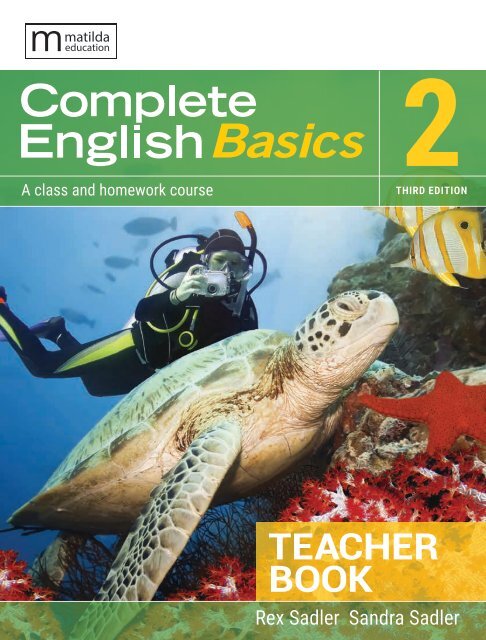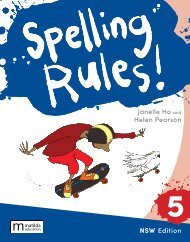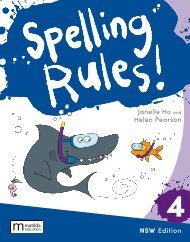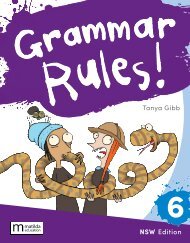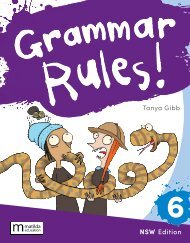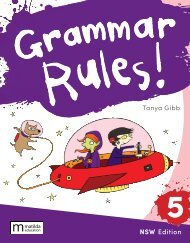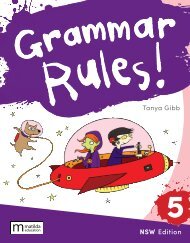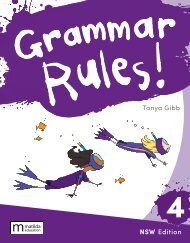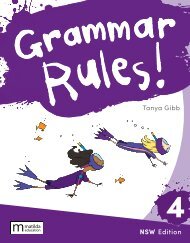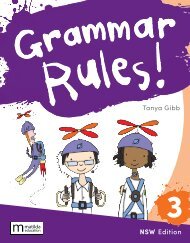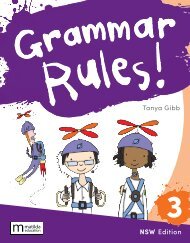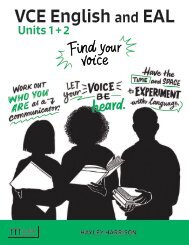Complete English Basics 2 Teacher Book
Complete English Basics is a workbook designed to support junior to middle secondary students with essential language and literacy skills. Highly structured units are organised into sections on comprehension, spelling and vocabulary, language, punctuation and writing, making the book ideal for both classwork and homework. Exercises are contextualised through high-interest topics that will fully engage students' attention. The book also features a wide variety of activity types clear, concise explanations of grammar and punctuation rules sequential development of language skills. This third edition includes additional content on writing, updated extracts and a new design. It also includes additional worksheets, plus answers, accessed via the digital download code in each Teacher Book in the categories: Literature, Spelling and Vocabulary, Language, and The Craft of Writing, mimicking the structure of the print books.
Complete English Basics is a workbook designed to support junior to middle secondary students with essential language and literacy skills. Highly structured units are organised into sections on comprehension, spelling and vocabulary, language, punctuation and writing, making the book ideal for both classwork and homework. Exercises are contextualised through high-interest topics that will fully engage students' attention. The book also features a wide variety of activity types clear, concise explanations of grammar and punctuation rules sequential development of language skills. This third edition includes additional content on writing, updated extracts and a new design. It also includes additional worksheets, plus answers, accessed via the digital download code in each Teacher Book in the categories: Literature, Spelling and Vocabulary, Language, and The Craft of Writing, mimicking the structure of the print books.
Create successful ePaper yourself
Turn your PDF publications into a flip-book with our unique Google optimized e-Paper software.
2<br />
A class and homework course<br />
THIRD EDITION<br />
TEACHER<br />
BOOK<br />
Rex Sadler Sandra Sadler
2<br />
A class and homework course<br />
THIRD EDITION<br />
TEACHER<br />
BOOK<br />
Rex Sadler Sandra Sadler
This edition published in 2021 by<br />
Matilda Education Australia, an imprint<br />
of Meanwhile Education Pty Ltd<br />
Level 1/274 Brunswick St<br />
Fitzroy, Victoria Australia 3065<br />
T: 1300 277 235<br />
E: customersupport@matildaed.com.au<br />
www.matildaeducation.com.au<br />
First edition published in 2007 by Macmillan Science and Education Australia Pty Ltd<br />
Copyright © Rex Sadler and Sandra Sadler 2007, 2010, 2017<br />
The moral rights of the author have been asserted.<br />
All rights reserved.<br />
Except under the conditions described in the<br />
Copyright Act 1968 of Australia (the Act) and subsequent amendments,<br />
no part of this publication may be reproduced,<br />
stored in a retrieval system, or transmitted in any form or by any means,<br />
electronic, mechanical, photocopying, recording or otherwise,<br />
without the prior written permission of the copyright owner.<br />
Educational institutions copying any part of this book<br />
for educational purposes under the Act must be covered by a<br />
Copyright Agency Limited (CAL) licence for educational institutions<br />
and must have given a remuneration notice to CAL.<br />
Licence restrictions must be adhered to. For details of the CAL licence, contact:<br />
Copyright Agency Limited, Level 11, 66 Goulburn Street, Sydney, NSW 2000.<br />
Telephone: (02) 9394 7600. Facsimile: (02) 9394 7601. Email: memberservices@copyright.com.au<br />
Publication data<br />
Authors: Rex Sadler and Sandra Sadler<br />
Title: <strong>Complete</strong> <strong>English</strong> <strong>Basics</strong> 2 <strong>Teacher</strong> <strong>Book</strong>: A Class and Homework Course<br />
ISBN: 978 1 4202 3713 9<br />
Publisher: Emma Cooper<br />
Project editor: Barbara Delissen<br />
Cover and text designer: Dim Frangoulis<br />
Production control: Janine Biderman and Katherine Fullagar<br />
Photo research and permissions clearance: Fiona Byrne and Vanessa Roberts<br />
Typeset in Heuristica Regular 10.5/12pt by DiZign Pty Ltd<br />
Cover image: Adobe Stock/Olga Khoroshunova<br />
Printed in by <br />
1 2 3 4 5 6 7 25 24 23 22 21 20<br />
Warning: It is recommended that Aboriginal and Torres Strait Islander peoples exercise caution<br />
when viewing this publication as it may contain images of deceased persons.
Contents<br />
Prefacevii<br />
Acknowledgementsviii<br />
1 Images and words 1<br />
Comprehension Film poster 1<br />
Cartoon 3<br />
Spelling and vocabulary Behaviour 4<br />
Language What is a clause? 6<br />
Main clauses 6<br />
Dependent (subordinate) clauses 6<br />
Punctuation How well do you punctuate? 8<br />
The craft of writing The graphic novel 8<br />
2 Factual texts 10<br />
Comprehension Information report 10<br />
Autobiography 12<br />
Spelling and vocabulary Confusing pairs 14<br />
Language Dependent (subordinate) clauses 15<br />
Punctuation Reviewing punctuation 17<br />
The craft of writing Autobiography 18<br />
3 Planet Earth 19<br />
Comprehension Global warming 19<br />
Spelling and vocabulary The Earth 21<br />
Language Nouns 22<br />
Punctuation Starting and finishing sentences 23<br />
The craft of writing Problems of planet Earth 25<br />
4 This sporting life 26<br />
Comprehension The race 26<br />
Spelling and vocabulary Sport 28<br />
Language Proper and common nouns 30<br />
Punctuation Punctuating fables 31<br />
The craft of writing Becoming a better writer 32<br />
978 1 4202 3713 9<br />
iii
iv Contents<br />
978 1 4202 3713 9<br />
5 Hard times 33<br />
Comprehension Shoes 33<br />
Spelling and vocabulary Money matters 35<br />
Language Collective nouns 36<br />
Abstract nouns 37<br />
Punctuation The full stop, question mark and exclamation mark 38<br />
The craft of writing Poverty 39<br />
6 Inventions40<br />
Comprehension Credit cards 40<br />
Shopping trolleys 41<br />
Spelling and vocabulary Inventions and discoveries 42<br />
Language Singular and plural nouns 43<br />
Forming plural nouns 44<br />
Punctuation Commas 45<br />
The craft of writing Describing objects 46<br />
7 War and peace 47<br />
Comprehension The hiding place 47<br />
Spelling and vocabulary In the line of fire 49<br />
Language More plural nouns 50<br />
Punctuation Statements and questions 52<br />
The craft of writing War and peace 53<br />
8 All about people 54<br />
Comprehension Robyn 54<br />
Spit Nolan 55<br />
Spelling and vocabulary Up-front and personal 56<br />
Language Using adjectives 58<br />
Punctuation Apostrophes 59<br />
The craft of writing Using details to describe people 60<br />
9 In the wild 61<br />
Comprehension Stingrays 61<br />
Spelling and vocabulary Creatures in the wild 63<br />
Language Adjectives of comparison 64<br />
Punctuation Capital letters 66<br />
The craft of writing The world of animals 67<br />
10 Music, music, music 68<br />
Comprehension ‘The nocturne in the corner phonebox’ 68<br />
Spelling and vocabulary The sound of music 70<br />
Language Onomatopoeia 72<br />
Punctuation Punctuating dialogue 73<br />
The craft of writing Using sound words 74
978 1 4202 3713 9<br />
Contents<br />
<br />
v<br />
11 The world of books 75<br />
Comprehension The emu 75<br />
Banana fact file 76<br />
Spelling and vocabulary All about books 77<br />
Language Synonyms 78<br />
Antonyms 79<br />
Homonyms 79<br />
Punctuation Using the apostrophe to abbreviate words 80<br />
The craft of writing What’s that you’re reading? 81<br />
12 Places82<br />
Comprehension Beneath the sea 82<br />
Spelling and vocabulary Describing places 84<br />
Language Personal pronouns 85<br />
Punctuation Direct and indirect speech 87<br />
The craft of writing Describing a place 88<br />
13 School days 89<br />
Comprehension Conflict in the classroom 89<br />
Spelling and vocabulary Education 91<br />
Language Verbs 92<br />
Punctuation Using the apostrophe to show ownership 94<br />
The craft of writing School days 95<br />
14 Disaster96<br />
Comprehension Plane crash in the Andes 96<br />
Spelling and vocabulary Emergency 98<br />
Language Verbs tell time 99<br />
Punctuation Apostrophes—avoiding confusion 101<br />
The craft of writing Narratives 102<br />
15 On the farm 103<br />
Comprehension A plague of locusts 103<br />
Spelling and vocabulary On the land 105<br />
Language Present participles 106<br />
Forming present participles 107<br />
Punctuation Using commas 107<br />
The craft of writing Plagues and epidemics 109<br />
16 Health 110<br />
Comprehension What it feels like to be stuck in a tornado 110<br />
Spelling and vocabulary The human body 112<br />
Language Past participles 113<br />
Punctuation Abbreviations 115<br />
The craft of writing Describing feelings 116
vi Contents<br />
978 1 4202 3713 9<br />
17 Abandon ship! 117<br />
Comprehension Torpedoed 117<br />
Spelling and vocabulary On the move 119<br />
Language Adverbs 120<br />
Forming adverbs 121<br />
Punctuation Colons 122<br />
The craft of writing The force of nature 123<br />
18 Let’s go to the movies 124<br />
Comprehension ‘A bundle of twists in a dragon’s tale: Eragon’ 124<br />
Spelling and vocabulary At the movies 126<br />
Language Idioms 127<br />
Punctuation Paragraphs 129<br />
The craft of writing Writing a film review 130<br />
19 Read all about it! 131<br />
Comprehension ‘Paraglider pilot survives horror storm ascent’ 131<br />
Spelling and vocabulary The newspaper 133<br />
Language Prefixes 134<br />
Punctuation Quotation marks for speech 135<br />
The craft of writing A news report 137<br />
20 The great outdoors 138<br />
Comprehension Rapids ahead! 138<br />
Spelling and vocabulary In the wilderness 140<br />
Language Conjunctions 141<br />
Punctuation Question marks and exclamation marks in speech 143<br />
The craft of writing Untamed lands 144<br />
21 Careers145<br />
Comprehension A day in the life of a naturalist 145<br />
Spelling and vocabulary People at work 147<br />
Language Suffixes 148<br />
Punctuation Revision—punctuating sentences 149<br />
The craft of writing What I would like to be 150<br />
22 Numbers, shapes and sizes 151<br />
Comprehension The great pyramids of Egypt 151<br />
Spelling and vocabulary Counting and measuring 153<br />
Language Numbers as adjectives 154<br />
Numbers and prefixes 155<br />
Punctuation Revision—punctuating sentences 156<br />
The craft of writing How/why did it happen? 157<br />
Back-of-the-book dictionary 158<br />
<strong>Teacher</strong>s will find extra activities, ‘Fun with words’, online.
Preface<br />
<strong>Complete</strong> <strong>English</strong> <strong>Basics</strong> 2 sets out to present essential <strong>English</strong> skills in an interesting and<br />
meaningful way for junior secondary students.<br />
This third edition covers essential language and literacy skills underpinning the Australian<br />
curriculum. It incorporates a wide range of comprehension texts, spelling and vocabulary<br />
development, as well as language work on sentences, phrases, parts of speech, word families and<br />
paragraphing. It is important to note that eleven creative writing and punctuation units have been<br />
added to this new edition.<br />
The workbook can be used as a class or homework text. One approach would be to have<br />
students complete each unit over a two-week period.<br />
The stimulus materials and exercises are designed to improve comprehension and vocabulary<br />
skills, as well as language usage and spelling. A special feature is the back-of-the-book dictionary, which<br />
encourages students to expand their vocabulary by looking up the meanings of unfamiliar words.<br />
Correct spelling is essential for good communication. Research has shown that in those<br />
classrooms where teachers are concerned about correct spelling and vocabulary enrichment, the<br />
students’ spelling level improves significantly. It is a good idea, if time allows, to have a brief spelling<br />
test at the end of each unit using the words from the spelling and vocabulary list.<br />
The extracts are engaging and cover a diverse range of topics—from tornadoes to Egyptian<br />
pyramids. A range of genres is represented including biography, crime, fiction and adventure.<br />
Above all, we hope that students will enjoy their studies as they gain basic <strong>English</strong> skills.<br />
Rex and Sandra Sadler<br />
978 1 4202 3713 9<br />
vii
Acknowledgements<br />
The author and publisher are grateful to the following for permission to reproduce copyright material:<br />
Photographs<br />
ALAMY/A.F. ARCHIVE, 81, 124, /Archive Images, 144, /<br />
Movie Stills, 130; Cartoonstock/Mark Lynch, 3; FAIRFAX<br />
SYNDICATION/Dean Osland, 54; GETTY IMAGES/Archive<br />
Photos/Stringer, 46, /Brendon Thorne, 123, /Corbis/<br />
VCG, 28, ISTOCKPHOTO/, 26, /4x6, 40, /Aimin Tang,<br />
47, /Alfsky, 89, /Amanda Rohde, 56, /AmmentorpDK, 4,<br />
/-Antonio-, 157, /bjones27, 126, /blackred, 32, /btrenkel,<br />
84, /Craig Dingle, 147, /Craig Dingle, 35, /davidf, 153,<br />
/donald_gruener, 110, /dra_schwartz, 91, /edelmar,<br />
103, /Fatman73, 76, /Forest Woodward, 112, /Geir-Olav<br />
Lyngfjell, 140, /GlobalP, 14, /Ingvald kaldhussæter, 33, /<br />
Island Effects, 82, /Jan Wolffgang, 67, /John Pitcher, 145,<br />
/Justin Horrocks, 98, /karimhesham, 151, /kcline, 42, /<br />
Kenneth Canning, 10, /kevinruss, 116, /kevinruss, 117, /<br />
kirstypargeter, 77, /kmaassrock, 133, /Lise Gagne, 105, /<br />
MR1805, 119, /Nathan Jaskowiak, 96, /oscarhdez, 102,<br />
/Rafal Olkis, 49, /Robert Pernell, 138, /Saivann, 68, /<br />
SandraKavas, 88, /shironosov, 18, /susan flashman,<br />
75, /Tim Mccaig, 70, /vlad_karavaev, 39; Newspix/<br />
James Croucher, 131; Photos.com, 60, 61, 63, 74;<br />
SHUTTERSTOCK/Albie Venter, 21, /Alex Hinds, Design<br />
element, /M. Shcherbyna, 25, /Shcherbinator, 137, /<br />
Simon_g, 109, /Tifonimages, 19, /wavebreakmedia, 150,<br />
The Kobal Collection/20th Century Fox, 1.<br />
Other material<br />
‘Treasure Island’ image panel adapted by Seymour Reit,<br />
art by Ernie Colón, lettering by George Roberts and<br />
colours by Luisa Colón from Treasure Island by Robert<br />
Louis Stevenson. Copyright © 1995 by Bank Street College<br />
of Education. Reproduced by permission of Bank Street<br />
College of Education, 9; Extract from Whitaker’s World of<br />
Facts by Russell Ash, Bloomsbury, 2005, 76; Extract from<br />
True Spirit by Jessica Watson, Hachette, 2010, 123; Cover<br />
and extract from Twopence to Cross the Mersey, reprinted<br />
by permission of HarperCollins Publishers Ltd, © 1981<br />
Helen Forrester, 12–13; Extract ‘Attacked by a swarm of<br />
African killer bees’ from What It Feels Like, reprinted by<br />
permission of Harper Collins Publishers Ltd © 2003 Edited<br />
by AJ Jacobs, 109; Extract ‘What it feels like to be stuck in a<br />
tornado’ by John Neidigh from What It Feels Like, reprinted<br />
by permission of Harper Collins Publishers Ltd © 2003<br />
Edited by AJ Jacobs, 110; Extract from Angela’s Ashes,<br />
reprinted by permission of HarperCollins Publishers Ltd,<br />
© 1996 Frank McCourt, 33–4; Extract from The Overloaded<br />
Ark by Gerald Durrell, Faber and Faber, 1953, 145–6;<br />
Extract from Blueback by Tim Winton, Jenny Darling and<br />
Associates, 82–3, 85; Extract from Lockie Leonard, Human<br />
Torpedo by Tim Winton, Jenny Darling and Associates,<br />
89–90; Extract from The Habit of Loving, Copyright ©<br />
1978 by Doris Lessing, Featured by kind permission of<br />
Jonathan Clowes Ltd., London, on behalf of The Estate of<br />
Doris Lessing, 103–4; Extract from Macquarie Compact<br />
Dictionary, 2014, 75; Extract from The <strong>Book</strong> Thief by<br />
Markus Zusak reprinted by permission of Pan Macmillan<br />
Australia Pty Ltd. Copyright © Markus Zusak 2005, 81;<br />
Extract from Tomorrow, When the War Began by John<br />
Marsden reprinted by permission of Pan Macmillan<br />
Australia Pty Ltd. Copyright © JLM Pty Ltd 1993, 54;<br />
Extract from Mao’s Last Dancer by Li Cunxin, Penguin<br />
<strong>Book</strong>s Australia, 2003, 39; Cover of Little Brother by Alan<br />
Baillie, Puffin, 2004, Penguin Australia Pty Ltd, 53; Cover<br />
and extract from The Chocolate War by Robert Cormier,<br />
copyright © 1974 by Robert Cormier. Used by permission<br />
of Random House Children’s <strong>Book</strong>s, a division of Penguin<br />
Random House LLC. All rights reserved, 95; Extract from<br />
Cold River by William Judson, copyright © 1974 by Cork<br />
Tree, Inc. Used by permission of New American Library,<br />
an imprint of Penguin Publishing Group, a division of<br />
Penguin Random House LLC, 138; ‘Chapter three’ from<br />
The Cay by Theodore Taylor, copyright © 1969 by Theodore<br />
Taylor. Used by permission of Delacorte Press, an imprint<br />
of Random House Children’s <strong>Book</strong>s, a division of Penguin<br />
Random House LLC. All rights reserved, 117–18; Extract<br />
from Spit Nolan by Bill Naughton reprinted by permission<br />
of Peters Fraser & Dunlop (www.petersfraserdunlop.<br />
com) on behalf of the Estate of Bill Naughton, 55; Extract<br />
from Alive by Piers Paul Read, Random House, 1974,<br />
96–7; Extract from The Silver Sword by Ian Serraillier,<br />
Random House, 1956, 47; Extract from Frozen Fire: A Tale<br />
of Courage by James Houston, Simon Schuster, 1992, 67;<br />
‘A bundle of twists in a dragon’s tale’ by Paul LePetit, in<br />
The Sunday Telegraph, 17 Dec 2006, 124; E.T. film review<br />
by Paul LePetit, in The Sunday Telegraph TV Guide, 24 Dec<br />
2006, 130; ‘The nocturne in the corner phonebox’, by<br />
Andrew Taylor, 68; Extract from Dougy by James Maloney,<br />
University of Queensland Press, 1993, 26; ‘Paraglider<br />
pilot survives horror storm ascent’ by DD McNicoll, The<br />
Weekend Australian, 17 Feb 2007, 131–2.<br />
The author and publisher would like to acknowledge the<br />
following:<br />
Extract from Little Brother by Alan Baillie, Puffin, 2004,<br />
53; Extract from Frozen Fire: A Tale of Courage by James<br />
Houston, Estate of James Houston, 1992, 67.<br />
While every care has been taken to trace and acknowledge<br />
copyright, the publisher tenders their apologies for any<br />
accidental infringement where copyright has proved<br />
untraceable. They would be pleased to come to a suitable<br />
arrangement with the rightful owner in each case.<br />
viii 978 1 4202 3713 9
Images<br />
and words<br />
1<br />
Comprehension<br />
Film poster<br />
Look at the film poster and answer the questions that follow.<br />
978 1 4202 3713 9<br />
1
2 <strong>Complete</strong> <strong>English</strong> <strong>Basics</strong> 2<br />
978 1 4202 3713 9<br />
Reading for understanding<br />
1 What is the advertiser’s purpose in creating this poster?<br />
The advertiser’s purpose is to persuade the reader to go and see the film.<br />
2 In this poster, what immediately draws the audience’s attention? Why?<br />
The audience’s attention is drawn to the scissor hands because they are so unusual.<br />
3 How are the scissor hands positioned in relation to the two characters?<br />
The scissor hands are in the foreground and given prominence.<br />
4 How does the poster’s image show that the film is a love story?<br />
The woman has her arms around Edward’s neck which suggests her tenderness and love for<br />
him.<br />
5 Which words in the poster indicate that the young woman is attracted to Edward?<br />
‘Beauty is what she sees’.<br />
6 Which words tell the audience about the character of Edward?<br />
‘The story of an uncommonly gentle man.’<br />
‘Innocence is what he knows.’<br />
7 ‘… an uncommonly gentle man.’ Why do we wonder whether Edward can be gentle?<br />
His scissor hands make it seem impossible for Edward to be gentle.<br />
8 How does the film image suggest that Edward is the main character?<br />
Edward’s face is directed towards the audience and he stands taller than Kim.<br />
9 Why do you think the advertiser mentions two of the director’s previous films, Batman<br />
and Beetlejuice ?<br />
This suggests that the director is experienced: he has made two previous, well-known films.<br />
10 Why do you think the title has ‘edward’ in lower case and ‘SCISSORHANDS’ in capital<br />
letters?<br />
The advertiser wants to draw the audience’s attention to Edward’s unusual hands.<br />
11 What emotions are presented in the image?<br />
The feelings of love and sadness are presented in the image.<br />
12 What else in the image, other than his hands, suggests that Edward is an unusual<br />
character?<br />
Edward’s hair, clothes and make-up suggest that he is an unusual character.<br />
12 marks
978 1 4202 3713 9<br />
1 Images and words 3<br />
Cartoon<br />
Reading for understanding<br />
1 What is the cartoonist’s purpose?<br />
The cartoonist sets out to condemn the civilised world for the pollution of the ocean.<br />
2 How do the survivors know that they have reached civilisation?<br />
They know they have reached civilisation by the huge amount of rubbish floating towards <br />
them.<br />
3 How does the cartoonist show that the survivors have endured much hardship?<br />
The survivors are thin and weak from a lack of food and their clothes are all tattered.<br />
<br />
4 What emotions do the survivors experience when they see the garbage floating on the<br />
water?<br />
They are overjoyed and relieved to reach civilisation.<br />
5 What has the cartoonist identified about our society’s values?<br />
The cartoonist has identified our society’s lack of concern about the pollution of the natural<br />
world.<br />
5 marks
4 <strong>Complete</strong> <strong>English</strong> <strong>Basics</strong> 2<br />
978 1 4202 3713 9<br />
Spelling and vocabulary<br />
Behaviour<br />
guess defiance gratitude similarity truly<br />
perfection juvenile confiscate observant anonymous<br />
praise resistance impostor prohibit amiable<br />
stupidity minority completely prevention degradation<br />
unanimous rejection noisily patriotism compulsory<br />
respectable impulsive permit difficulties hurriedly<br />
Finding list words<br />
Use list words to complete these sentences.<br />
1 minority is the opposite of majority.<br />
2 hurriedly is the adverb formed from hurry.<br />
3 difficulties is the plural of difficulty.<br />
4 noisily is the opposite of quietly.<br />
5 impulsive is the adjective formed from impulse.<br />
6 anonymous means having no name or authorship.<br />
7 truly is the adverb formed from true.<br />
8 juvenile means of, or for, young people.<br />
9 patriotism means love of one’s country.<br />
10 defiance is the noun formed from defy.<br />
11 observant is the adjective formed from observe.<br />
12 unanimous means everyone is in complete agreement.<br />
13 completely is the adverb formed from complete.<br />
14 confiscate means to seize or take away.<br />
15 similarity is the state of being similar.<br />
16 praise means to express approval or admiration of.<br />
17 compulsory is the adjective formed from compel.<br />
18 amiable means friendly and good-natured.<br />
19 prohibit is a verb meaning to forbid or prevent.<br />
20 respectable means good, or worthy of respect.<br />
20 marks
978 1 4202 3713 9<br />
1 Images and words 5<br />
Word skills<br />
1 Form nouns ending in ‘-ion’ for each of the following list words.<br />
a permit permission d confiscate confiscation<br />
b prohibit prohibition e compulsory compulsion<br />
c observant observation f completely completion<br />
2 Write a list word similar in meaning to each of the following words.<br />
a allow permit c totally completely<br />
b sincerely truly d foolishness stupidity<br />
3 Write a list word opposite in meaning to each of the following words.<br />
a voluntary compulsory c slowly hurriedly<br />
b quietly noisily d ingratitude gratitude<br />
14 marks<br />
Adding list words<br />
<strong>Complete</strong> the following by using appropriate words from your list. The first letter of each word<br />
is given to help you. Use each list word once only.<br />
The quest for freedom<br />
The r resistance group had made a u unanimous decision to depose<br />
the i impostor who was trying to p prohibit them from gaining a democracy.<br />
An a anonymous letter had been h hurriedly circulated and the people<br />
showed their d defiance by an i impulsive attack on the parliament building.<br />
A r respectable member of the community pleaded that the dictator should<br />
recognise the d difficulties faced by the people and demanded that he no longer<br />
should have the power to c confiscate their properties.<br />
Back-of-the-book dictionary<br />
The list word ‘permit’ is made up of two Latin words: per meaning<br />
‘through’ and mitto, meaning ‘I send’. ‘To permit’ is ‘to send somebody<br />
through’ or ‘to let someone pass through’. There are many words in<br />
<strong>English</strong> that begin with the Latin prefix per-. Here are a few of them.<br />
Using the back-of-the-book dictionary, write their meanings.<br />
percolate: to drip through; to filter<br />
perennial: through the years; year after year<br />
perforate: to bore through; to make a hole in<br />
persist: to continue doing something, often in spite of difficulty<br />
permeable: able to be passed through<br />
11 marks<br />
5 marks
6 <strong>Complete</strong> <strong>English</strong> <strong>Basics</strong> 2<br />
978 1 4202 3713 9<br />
Language<br />
What is a clause?<br />
A clause is a group of words expressing a complete thought. A clause contains a subject and a verb.<br />
Clauses are often joined together to form sentences. The following sentence is made up of a<br />
main clause and two dependent clauses.<br />
Owls are able to catch small animals because they have strong night vision,<br />
which enables them to see in the dark.<br />
Dependent clause<br />
(The first dependent clause begins with the conjunction ‘because’ and the second with the relative<br />
pronoun ‘which’.)<br />
Main clauses<br />
Main clause<br />
Dependent clause<br />
A main clause (also called a principal clause or independent clause) contains a verb and a subject.<br />
It usually makes sense on its own and may also form a complete sentence in itself.<br />
A burst of lightning lit up the sea.<br />
It very often combines with other main and dependent clauses to form sentences.<br />
Main clause<br />
Conjunction<br />
Falcons are not huge birds, but they can fly very fast.<br />
Please note: in the above sentence the two main clauses are joined by the coordinating conjunction<br />
‘but’.<br />
Dependent (subordinate) clauses<br />
Main clause<br />
A dependent clause (also known as a subordinate clause) is a group of words that has both a<br />
subject and a verb, but it cannot stand alone as a sentence.<br />
It is not able to function by itself. It usually begins with a conjunction or a relative pronoun,<br />
as seen in the dependent clauses in bold below.<br />
Dark clouds scudded across the horizon as the storm approached.<br />
The old man, who was smiling happily, hugged his grandchild.<br />
Identifying clauses<br />
Identify the clauses as set out in each example.<br />
1 When he was nearly thirteen, my brother Jem got his arm badly broken at the elbow.<br />
from To Kill a Mockingbird by Harper Lee<br />
Dependent clause: When he was nearly thirteen<br />
Main clause: my brother Jem got his arm badly broken at the elbow
978 1 4202 3713 9<br />
1 Images and words 7<br />
2 Once there were four children whose names were Peter, Susan, Edmund and Lucy.<br />
from The Lion, the Witch and the Wardrobe by CS Lewis<br />
Main clause: Once there were four children<br />
Dependent clause: whose names were Peter, Susan, Edmund and Lucy<br />
3 He was an old man who fished alone in a skiff in the Gulf Stream and he had gone<br />
eighty-four days now without taking a fish.<br />
from The Old Man and the Sea by Ernest Hemingway<br />
Main clause 1: He was an old man<br />
Dependent clause: who fished alone in a skiff in the Gulf Stream<br />
Main clause 2: he had gone eighty-four days now without taking a fish<br />
4 Once upon a time there were four little rabbits, and their names were Flopsy, Mopsy,<br />
Cotton-tail and Peter.<br />
from The Tale of Peter Rabbit by Beatrix Potter<br />
Main clause 1: Once upon a time there were four little rabbits<br />
Main clause 2: their names were Flopsy, Mopsy, Cotton-tail and Peter<br />
5 When Mr Bilbo Baggins of Bag End announced that he would shortly be celebrating his<br />
eleventy-first birthday with a party of special magnificence, there was much talk and<br />
excitement in Hobbiton.<br />
from The Lord of the Rings by JRR Tolkien<br />
Dependent clause 1: When Mr Bilbo Baggins of Bag End announced<br />
Dependent clause 2: that he would shortly be celebrating his eleventy-first birthday with<br />
a party of special magnificence<br />
Main clause: there was much talk and excitement in Hobbiton<br />
6 All animals are equal, but some are more equal than others.<br />
from Animal Farm by George Orwell<br />
Main clause 1: All animals are equal<br />
Main clause 2: some are more equal than others<br />
7 The drought had lasted now for ten million years, and the reign of the terrible lizards had<br />
long since ended.<br />
from 2001: A Space Odyssey by Arthur C Clarke<br />
Main clause 1: The drought had lasted now for ten million years<br />
Main clause 2: the reign of the terrible lizards had long since ended<br />
8 A woman must have money and a room of her own if she is to write fiction.<br />
from A Room of One's Own by Virginia Woolf<br />
Main clause: A woman must have money and a room of her own<br />
Dependent clause: if she is to write fiction<br />
18 marks
8 <strong>Complete</strong> <strong>English</strong> <strong>Basics</strong> 2<br />
978 1 4202 3713 9<br />
Punctuation<br />
How well do you punctuate?<br />
Imagine where we’d be without punctuation. We’d have no sentences or paragraphs. There would<br />
be no capital letters to tell us where to begin a sentence, no full stops to tell us where to end one,<br />
and no commas to tell us where to pause. There would just be a never-ending block of print or<br />
writing. Reading a book, newspaper or magazine would be intolerable.<br />
To give you an idea of what it would be like, here is a dramatic paragraph taken from the<br />
classic novel Swiss Family Robinson by Johann Rudolf Wyss. Your task is to rewrite the paragraph<br />
adding capital letters, full stops and commas. The number of sentences that you need to use is<br />
indicated in the brackets at the end.<br />
Encounter with a boa constrictor<br />
after the donkey ran from the beach it arrived at the lair of the snake and stopped<br />
although the donkey realised its danger it could not move the poor animal should have<br />
fled but it stood fascinated and uttered a low groan the boa its hungry jaws wide open<br />
approached steadily until it was within striking distance the donkey could not move<br />
because it was paralysed with fear it gazed at the monster that quickly wound its long<br />
scaly body around him and then suffocated him in the horrible embrace we shuddered as<br />
we looked at the fearful sight<br />
(seven sentences)<br />
from Swiss Family Robinson by Johann Rudolf Wyss<br />
After the donkey ran from the beach, it arrived at the lair of the snake and stopped. Although<br />
the donkey realised its danger, it could not move. The poor animal should have fled, but it<br />
stood fascinated and uttered a low groan. The boa, its hungry jaws wide open, approached<br />
steadily until it was within striking distance. The donkey could not move because it was<br />
paralysed with fear. It gazed at the monster that quickly wound its long scaly body around him<br />
and then suffocated him in the horrible embrace. We shuddered as we looked at the fearful<br />
sight.<br />
The craft of writing<br />
The graphic novel<br />
A graphic novel is a novel in a comic-strip format. It is a long story told in pictures and words. It<br />
features:<br />
• panels comprising words and pictures that show action and movement to develop the<br />
story<br />
• gutters, which are the spaces between the panels<br />
• speech balloons that enclose the dialogue<br />
• caption boxes containing information about a scene or character<br />
• visual sound effects using special lettering and onomatopoeia (e.g. ‘kapow!’).<br />
7 marks
978 1 4202 3713 9<br />
1 Images and words 9<br />
Creating graphic novel panels<br />
Many famous novels have been changed into graphic novels. Here are two panels from a graphic<br />
novel derived from Treasure Island by Robert Louis Stevenson. Notice how the combination of<br />
words and images brings the story to life. Now try your hand at converting an incident or scene<br />
from a novel, poem or story you have been reading. Four panels are provided for you to use.
2<br />
Factual texts<br />
Comprehension<br />
Read the following two texts and answer the questions.<br />
Information report<br />
Polar bears<br />
POLAR bears live in five countries— United<br />
States (Alaska), Canada, Russia, Greenland and<br />
Norway. Some have been seen near the North<br />
Pole but this is unusual as there is not much food<br />
there for them.<br />
They are the largest land carnivore. The males<br />
grow two to three times larger than the females.<br />
Their skin is black and their fur completely<br />
covers their body except for their nose and the<br />
soles of their feet. They shed their fur completely<br />
once a year and then re-grow their coat. Although<br />
the fur looks white or creamy yellow, each hair is<br />
transparent and hollow. This special type of hair<br />
transmits the sun’s heat directly to the base of<br />
the hair where it is absorbed by the black skin.<br />
Amazingly, polar bears are so well insulated they<br />
tend to overheat, so they move slowly and take<br />
regular rests. The excess heat is released through<br />
blood vessels close to the skin.<br />
Polar bears are strong swimmers and can<br />
swim up to 95 kilometres without resting. They<br />
can also swim underwater for up to two minutes<br />
by flattening their ears against their head and<br />
closing their nostrils.<br />
They mainly eat seals but will also eat carcasses<br />
of beluga whales, walruses, etc. Occasionally<br />
they themselves will kill young walruses and<br />
beluga whales. When food is scarce they will eat<br />
small rodents, seabirds, eggs, berries, kelp and<br />
even human garbage. They do not drink water<br />
because they get all the fluid they need from<br />
their food. Hungry polar bears that come into<br />
towns and camping sites looking for food are very<br />
dangerous and, if they attack, a human has little<br />
chance of surviving. Bears that attack humans are<br />
most often young adults and mothers with cubs.<br />
Most females give birth to two cubs once<br />
every three years. They enter a den where they<br />
sleep deeply. Their heart rate slows and their<br />
temperature drops slightly. This sleep is different<br />
to hibernation and the bears can be roused<br />
quickly if necessary. They give birth while in this<br />
deep sleep and remain in the den with the cubs<br />
until the outside temperature rises and the young<br />
cubs are able to travel.<br />
In 1968 the polar bear population was reported<br />
to be 10 000 but because government regulations<br />
now limit hunting, the population is now<br />
estimated to be between 21 000 and 28 000. Even<br />
so, polar bears are classified as ‘threatened’.<br />
Polar bears hunt from large platforms of ice<br />
called pack ice. Global warming is causing the<br />
ice to melt and the bears are forced to hunt<br />
from these platforms for shorter periods of<br />
time. This means that many are starving or<br />
are undernourished. Older, weaker bears in<br />
particular are prone to starvation.<br />
10 978 1 4202 3713 9
978 1 4202 3713 9<br />
2 Factual texts 11<br />
Reading for understanding<br />
Choose the correct answer for each of the following.<br />
1 Polar bears live mainly<br />
a at the North Pole.<br />
b in five different countries.<br />
c in dens.<br />
b in five different countries.<br />
2 The bears’ diet<br />
a can be quite varied.<br />
b never includes plant matter.<br />
c would never include human’s food.<br />
a can be quite varied.<br />
3 The male bears<br />
a are a similar size to the females.<br />
b are the largest land carnivores.<br />
c cannot swim underwater.<br />
b are the largest land carnivores.<br />
4 Polar bears<br />
a have pure white fur.<br />
b are poorly insulated.<br />
c have black skin.<br />
c have black skin.<br />
5 Female bears usually<br />
a give birth to a single cub.<br />
b take the cubs out of the den soon after their birth.<br />
c give birth to cubs once every three years.<br />
c give birth to cubs once every three years.<br />
6 Since 1968 the polar bear population<br />
a has increased.<br />
b has decreased.<br />
c has remained stable.<br />
a has increased.<br />
7 Polar bears<br />
a are likely to increase in numbers.<br />
b are completely protected from hunters.<br />
c are a threatened species.<br />
c are a threatened species.
12 <strong>Complete</strong> <strong>English</strong> <strong>Basics</strong> 2<br />
978 1 4202 3713 9<br />
8 Global warming<br />
a has had little effect on polar bears.<br />
b shortens the length of time bears can hunt.<br />
c has meant that fewer cubs survive.<br />
b shortens the length of time bears can hunt.<br />
9 A female polar bear<br />
a gives birth to cubs while in a deep sleep.<br />
b hunts for food during the winter months.<br />
c hibernates during the coldest months.<br />
a gives birth to cubs while in a deep sleep.<br />
10 Polar bears<br />
a react well to humans.<br />
b prefer human’s food to seals.<br />
c are willing to kill humans if disturbed.<br />
c are willing to kill humans if disturbed.<br />
10 marks<br />
Autobiography<br />
A young teacher asked me, as I stood uncertainly<br />
in the hall, what courses I wanted to take.<br />
I was aghast. I had no idea what courses to<br />
take. All I wanted was to continue my education<br />
from where I had left off nearly three years<br />
earlier.<br />
‘I’m not sure,’ I managed to mutter. ‘I know I<br />
need to learn arithmetic.’<br />
She pointed to an open doorway farther down<br />
the hall.<br />
‘Try bookkeeping,’ she said kindly, as she<br />
turned to attend to another lost youngster.<br />
I did not know what bookkeeping was, but<br />
I was so scared of the shifting, staring young<br />
people crowding round me, some of whom<br />
sniggered when they looked at me, that I bolted<br />
down the corridor and turned thankfully into a<br />
classroom holding about a dozen boys and girls<br />
and a young lady teacher.<br />
The classroom, with its walls of frosted glass<br />
and varnished wood, had enough desks, made<br />
to accommodate two pupils each, to swallow<br />
about fifty children; four electric lights hanging<br />
from the ceiling failed to illuminate it adequately;<br />
the bare wooden floor was grey from years of<br />
tramping boots. Facing the pupils’ desks was<br />
a high, single desk for the teacher and near it<br />
stood a blackboard<br />
on an easel. The air<br />
smelled of chalk<br />
dust and damp<br />
woollens. A dingy,<br />
uninspiring room it<br />
was, but it was made<br />
more lively by the<br />
buzz of conversation<br />
among the pupils.<br />
As I came through<br />
the door, the teacher<br />
looked up, and a pall<br />
of silence fell upon<br />
the gathering. The<br />
mouths of the neatly<br />
clad, well-scrubbed<br />
young people fell<br />
open. Then a well-curled blonde began to giggle.<br />
She hastily stuffed her handkerchief into her<br />
mouth, while a derisive grin spread through the<br />
class.<br />
The dim electric lights became blurred, as<br />
tears of realization welled up. I must have been<br />
a horrible sight, with hair draggling round my<br />
shoulders, its greasiness combed through with<br />
my fingers; septic acne sores all over my face;
978 1 4202 3713 9<br />
2 Factual texts 13<br />
hands with dirty, broken nails, sticking out<br />
from an ancient cardigan with huge holes in its<br />
elbows, no blouse, and a gym slip shiny with<br />
accumulated grime. Red blotches of bug bites<br />
were clearly visible on my naked legs and thighs,<br />
our new house being equally as verminous as our<br />
old one, and my toes stuck out of the holes in the<br />
laceless gym shoes on my feet.<br />
I fought back my tears. I was made of better<br />
stuff than the children before me.<br />
from Twopence to Cross the Mersey by Helen Forrester<br />
Reading for understanding<br />
1 Why was the narrator attending night school?<br />
She was attending night school to continue her education, to take up from where she left off<br />
nearly three years earlier.<br />
2 Why did the young teacher tell the narrator to try bookkeeping?<br />
The young teacher associated the learning of arithmetic with the study of bookkeeping.<br />
3 ‘I bolted down the corridor …’ What caused the narrator to do this?<br />
The narrator was afraid of the crowd of young people staring and sniggering at her.<br />
4 What are the smells in the classroom the narrator is conscious of?<br />
She was conscious of the smell of chalk dust and damp woollens.<br />
5 How did the class initially react as the narrator came through the door?<br />
The class fell silent.<br />
6 What comments does the narrator make about the appearance of the other young<br />
people in the room?<br />
The young people in the room were neatly clad and well scrubbed.<br />
7 ‘I must have been a horrible sight …’ What was ‘horrible’ about her face?<br />
She had septic sores all over her face.<br />
8 What was wrong with the narrator’s gym shoes?<br />
Her gym shoes had holes in the toes and no laces.<br />
9 What does the final short paragraph reveal about the narrator’s character?<br />
She was courageous and determined. Despite her poverty, she had faith in herself.<br />
10 Using the back-of-the-book dictionary, write the meanings to the following words.<br />
a aghast: shocked and frightened<br />
b dingy: having a dull, dirty colour and looking shabby<br />
c pall: a covering of gloom; a cloth for spreading over a coffin<br />
d derisive: mocking or making fun of someone<br />
13 marks
14 <strong>Complete</strong> <strong>English</strong> <strong>Basics</strong> 2<br />
978 1 4202 3713 9<br />
Spelling and vocabulary<br />
Confusing pairs<br />
soar counsellor principal pause lessen<br />
sore councillor principle paws lesson<br />
faint barren role colonel deceased<br />
feint baron roll kernel diseased<br />
medal profit loan mail current<br />
meddle prophet lone male currant<br />
Who am I?<br />
Write a list word for each of the following clues.<br />
1 I can prophesy the future. prophet<br />
2 I am in charge of a school. principal<br />
3 I am the opposite to female. male<br />
4 I am a senior officer in the army. colonel<br />
5 I am a nobleman. baron<br />
6 I am a member of a council. councillor<br />
7 I am an adviser; in particular, a psychologist. counsellor<br />
7 marks<br />
What am I?<br />
Write a list word for each of the following clues.<br />
1 I am the feet of an animal with nails or claws. paws<br />
2 I am given as an award for bravery or as a prize. medal<br />
3 I am sent by post. mail<br />
4 I am a small, dried, seedless grape. currant<br />
5 I am the part or character an actor plays. role<br />
6 I am money given, usually to be repaid with interest. loan<br />
7 I am the edible inner part of a nut. kernel<br />
8 I am a short rest or stop when speaking, etc. pause<br />
9 I am an injured, inflamed or infected part of the skin. sore<br />
10 I am the time when students are taught a subject. lesson<br />
10 marks
978 1 4202 3713 9<br />
2 Factual texts 15<br />
Back-of-the-book dictionary<br />
The word ‘current’ is a flow of air, water or electricity. It is derived from<br />
the Latin word curro, which means ‘I run’. Here are some of the words<br />
derived from curro. Use the back-of-the-book dictionary to write their<br />
meanings in the spaces below.<br />
recurrent: happening again or at intervals<br />
concur: to agree; to occur at the same time<br />
excursion: a short journey or trip usually taken for a special reason<br />
incur: to bring upon yourself<br />
succour: help or support<br />
currency: the money used in a country<br />
incursion: an invasion or raid<br />
7 marks<br />
Language<br />
Dependent (subordinate) clauses<br />
There are three kinds of dependent (subordinate) clauses—adjectival, adverbial and noun.<br />
Dependent clauses cannot stand alone. They are used with a main clause.<br />
Adjectival clauses do the work of adjectives. They describe nouns. They begin with the<br />
relative pronouns who, whose, whom, which or that.<br />
Adjectival clause<br />
Polar bears, which are strong swimmers, can swim 95 kilometres without resting.<br />
The students laughed at the newcomer whose clothes were in tatters.<br />
Adverbial clauses tell how, where, when and why. They begin with conjunctions such as when,<br />
while, since, after, until, before, although, though, unless, because, then, as, whether, if, than.<br />
Polar bears do not drink water, because they get all the fluid they need from their food.<br />
Adverbial clause of time<br />
When the new student came through the door, the teacher looked up.<br />
Noun clauses do the work of nouns. They often begin with a word such as that.<br />
Noun clause<br />
Adjectival clause<br />
It is a scientific fact that polar bears are the largest land carnivore.<br />
Noun clause<br />
The new student realised that she was a horrible sight.<br />
Adverbial clause giving the reason
16 <strong>Complete</strong> <strong>English</strong> <strong>Basics</strong> 2<br />
978 1 4202 3713 9<br />
Identifying clauses<br />
Identify the clauses in each sentence, as indicated.<br />
1 If a hungry polar bear attacks, a human has little chance of surviving.<br />
Adverbial clause: If a hungry polar bear attacks<br />
Main clause: a human has little chance of surviving<br />
2 The Ancient Egyptians and Greeks thought that giraffes were a mixture of camel and leopard.<br />
Main clause: The Ancient Egyptians and Greeks thought<br />
Noun clause: that giraffes were a mixture of camel and leopard<br />
3 Female polar bears give birth while they are in a deep sleep.<br />
Main clause: Female polar bears give birth<br />
Adverbial clause: while they are in a deep sleep<br />
4 There are not many bears that inhabit the North Pole, because food is in short supply there.<br />
Principal clause: There are not many bears<br />
Adjectival clause: that inhabit the North Pole<br />
Adverbial clause: because food is in short supply there<br />
5 When they are kept in captivity, African elephants prefer to eat hay, grain and vegetables.<br />
Adverbial clause: When they are kept in captivity<br />
Main clause: African elephants prefer to eat hay, grain and vegetables<br />
6 Although seals are mammals that live mostly underwater, they need to come up to the<br />
surface to breathe air.<br />
Adverbial clause: Although seals are mammals<br />
Adjectival clause: that live mostly underwater<br />
Main clause: they need to come to the surface to breathe air<br />
7 It is hard to believe that the first email was sent in 1972.<br />
Main clause: It is hard to believe<br />
Noun clause: that the first email was sent in 1972<br />
8 The Sumerians were the people who invented the wheel in about 3500 BC.<br />
Main clause: The Sumerians were the people<br />
Adjectival clause: who invented the wheel in about 3500 BC<br />
9 Although jaguars spend most of their time on the ground, they are able to climb trees<br />
because their sharp claws allow them to grab hold of trunks.<br />
Adverbial clause: Although jaguars spend most of their time on the ground<br />
Main clause: they are able to climb trees<br />
Adverbial clause: because their sharp claws allow them to grab hold of trunks<br />
10 Research has shown that the Earth is 4.5 billion years old.<br />
Main clause: Research has shown<br />
Noun clause: that the Earth is 4.5 billion years old<br />
23 marks
978 1 4202 3713 9<br />
2 Factual texts 17<br />
Punctuation<br />
Reviewing punctuation<br />
Punctuation marks work together to make the meaning of a sentence clearer for the reader. In<br />
its simplest form, a sentence begins with a capital letter and ends with a full stop, question mark<br />
or exclamation mark. After you have read through the review of the major punctuation marks,<br />
complete the exercise that follows.<br />
• A capital letter begins sentences and names.<br />
Albert Einstein was a famous mathematician.<br />
• A full stop (.) is used at the end of a sentence or abbreviation.<br />
School will finish at 2 p.m. today.<br />
• A comma (,) is used to indicate a pause or to separate items in a list.<br />
When the bell rang, the students put their books away.<br />
Emus, kookaburras, platypuses and kangaroos are Australian native animals.<br />
• A question mark (?) is used after a direct question has been asked.<br />
Are you going to the movies on Saturday?<br />
When is she leaving?<br />
• An exclamation mark (!) is used to end a sentence that expresses a strong feeling.<br />
Oh! What a beautiful morning! Fire! Look out!<br />
• An apostrophe (’) shows ownership or indicates the omission of a letter or letters from a<br />
word.<br />
The emperor’s palace was destroyed by the barbarians’ battering ram.<br />
He can’t pay his fine.<br />
Punctuating sentences<br />
She isn’t at school today.<br />
Rewrite each of the following sentences, inserting all the necessary punctuation.<br />
1 the polar bear is the biggest land hunter in the arctic<br />
The polar bear is the biggest land hunter in the Arctic.<br />
2 polar bears eat ringed seals walruses reindeer and musk oxen<br />
Polar bears eat ringed seals, walruses, reindeer and musk oxen.<br />
3 the fire in the department store destroyed childrens toys mens shirts and womens fashion<br />
The fire in the department store destroyed children’s toys, men’s shirts and women’s <br />
fashion.<br />
4 pres obama was the first african american to lead the united states.<br />
Pres. Obama was the first African American to lead the United States.<br />
5 its important to know whos coming to the party and when theyre arriving<br />
It’s important to know who’s coming to the party and when they’re arriving.<br />
6 leonardo da vincis famous painting of mona lisa hangs in the louvre in paris<br />
Leonardo da Vinci’s famous painting of Mona Lisa hangs in the Louvre in Paris.<br />
6 marks


